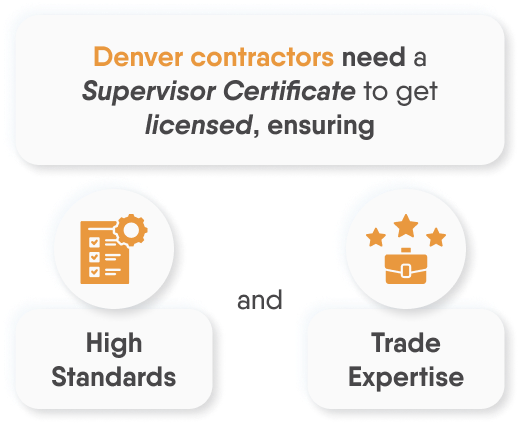Particularities of Denver Contractor Licensing Requirements
Denver, CO, has tough contractor licensing rules to keep construction safe and high-quality. If you’re a general contractor or work in a specific trade (like roofing or mechanical work), you must follow local licensing steps to avoid holdups or legal issues.

In Denver, you must get a Supervisor Certificate before you can apply for a contractor’s license. This certificate shows that you know your trade well. If you’re not a business owner but have this certificate, you need to give a signed letter saying you’re the “Supervisor of Record.” Each trade has its own rules for getting certified, which makes sure contractors can handle construction projects.
Denver’s special licensing system shows the city’s dedication to keeping high standards. It makes contractors meet certain qualifications to work.
Supervisor Certificates in Denver: Categories and Requirements
| Certificate | Experience | Testing | Scope of Work |
|---|---|---|---|
| Construction Certificates | 4 years | Building codes, safety, project management | Residential and commercial construction, renovations |
| Electrical Certificates | 2 years | Electrical codes, safety, systems | Electrical installations and maintenance |
| Mechanical Certificates | 4 years | Mechanical codes, safety, troubleshooting | HVAC, gas systems, refrigeration |
| Fire Protection Certificates | 3 years | Fire codes, safety, emergency protocols | Sprinklers, fire alarms, suppression systems |
| Demolition and Moving Certificates | 3 years | Structural safety, risk, regulations | Demolition, building relocation |
| Specialty Class D Certificates | 2-4 years (varies by trade) | Trade-specific codes, safety, installation | Roofing, signs, framing, tenant finishing |
By securing the appropriate Supervisor Certificate, contractors in Denver can ensure they are qualified to manage their specific trades and maintain compliance with local regulations. Each certificate represents a commitment to safety, professionalism, and adherence to Denver’s rigorous building codes.
For more information or to apply for a certificate, visit Denver’s Supervisor Certificate Page.
Applying for a Contractor’s License in Denver: Online, By Mail, and In-Person

Online Application
- Pros: Fast processing (1-2 weeks), easy tracking, immediate confirmation.
- Cons: Limited assistance.
- How: Upload documents (Supervisor Certificate, insurance, etc.), pay online, and track your status via the portal.

By Mail
- Pros: Keep physical copies of all documents.
- Cons: Slower (3-4 weeks), no real-time tracking
- How: Download the form, mail the completed application, required documents, and payment (check/money order).

In-Person Application
- Pros: Direct assistance from staff, real-time review.
- Cons: It requires a visit to the office, and the processing time is similar to online (1-2 weeks).
- How: Visit the office with documents, submit them in person, and pay by check or money order.
Required Secretary of State Documents for Contractor Licensing in Denver
When applying for a contractor’s license in Denver, specific Secretary of State documents are required based on your business structure:
- Corporations need articles of incorporation and a notarized officer list.
- LLCs must provide articles about the organization and a list of members/managers.
- Partnerships (General or LLP/LLLP) need partnership statements and notarized partner lists.
- Foreign companies need a statement of foreign authority.
- Sole proprietors using a trade name must submit their trade name registration.
For more details, visit the official website.
Types of Contractor Licenses in Denver
Denver issues different types of contractor licenses depending on the nature of your business and the scope of work you’ll be performing. Here’s an overview of the main types:

General Contractor License

Specialty Contractor License
Frequently Asked Questions (FAQ)
Depending on your business type, you’ll need Secretary of State documents like articles of incorporation (for corporations), articles of organization (for LLCs), and a trade name registration (for sole proprietors).
You can apply online, by mail, or in person at Denver’s Community Planning and Development office.
It’s a required certificate proving your trade experience and knowledge needed before applying for a contractor’s license.
Denver offers General Contractor Licenses for broad construction work and Specialty Contractor Licenses for specific trades like electrical or plumbing.
Processing times vary: online applications take 1-2 weeks, while mail-in applications may take 3-4 weeks.

